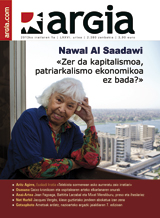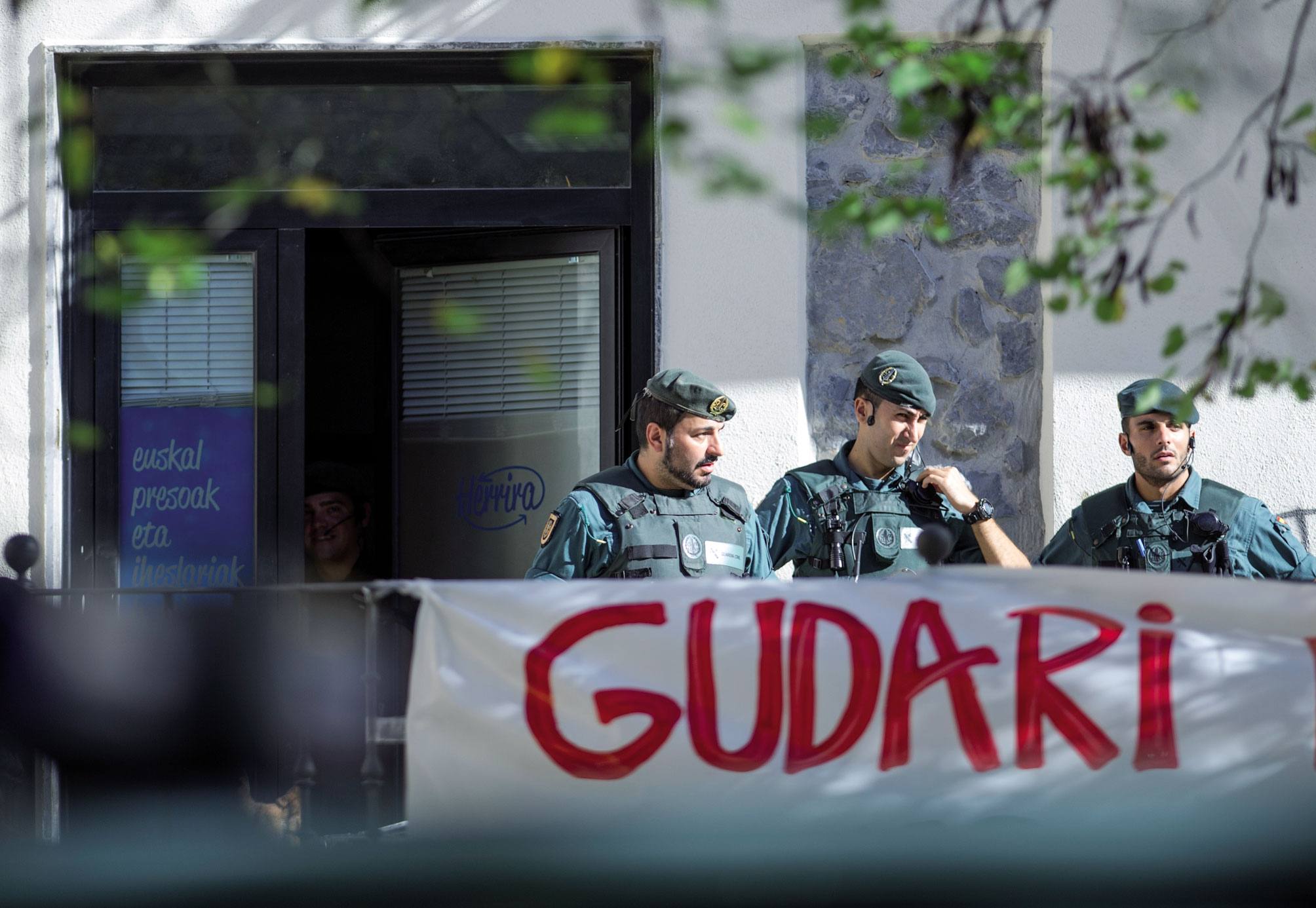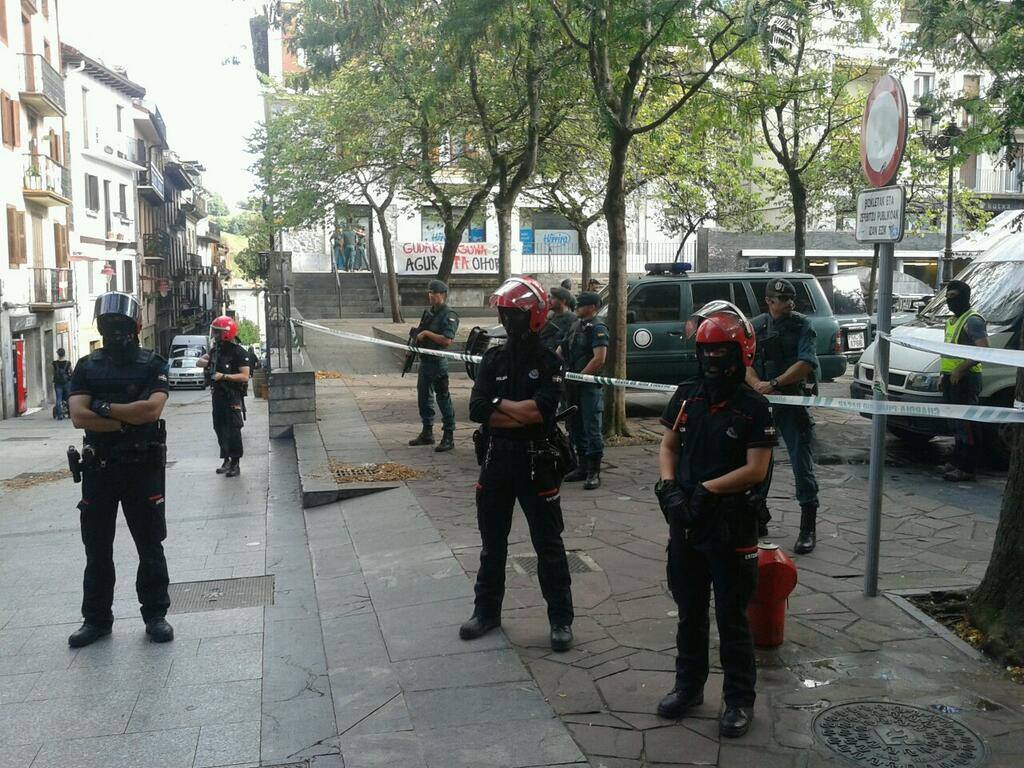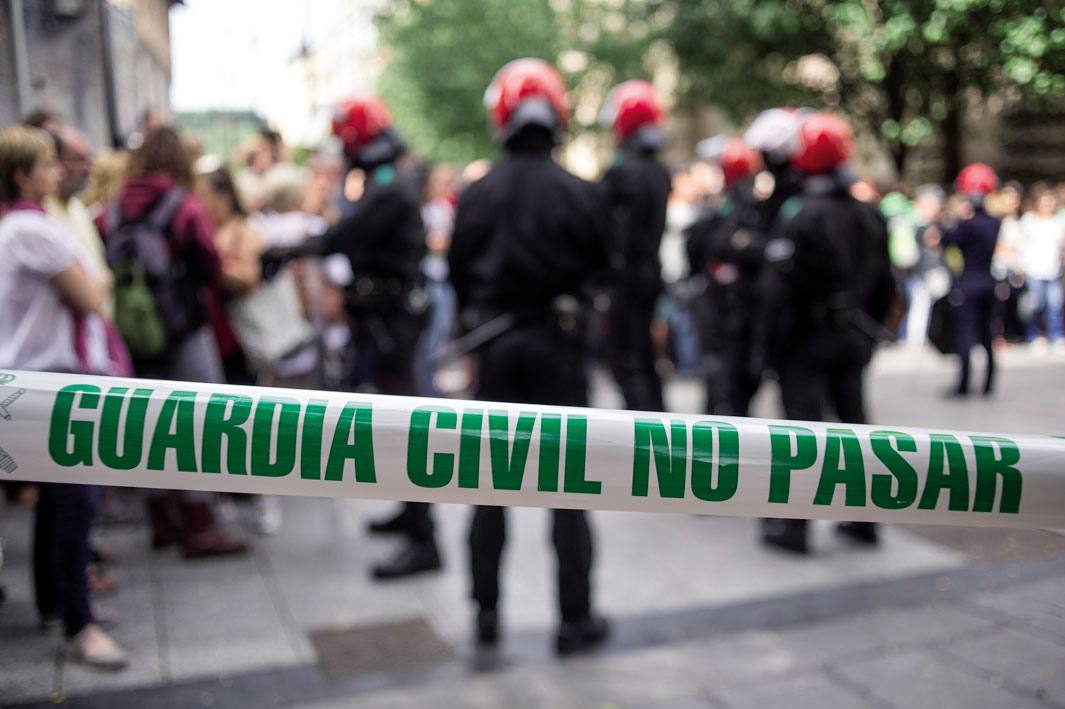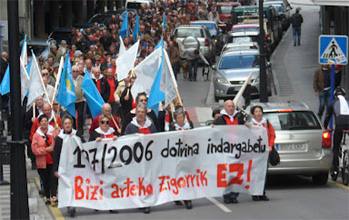The release of prisoners and the return of fugitives shall not be obtained separately.
- After Telesforo Monzón, Jean Fagoaga is the first member of Anai-Artea, founded in Sara in 1928. Doctor. Battitta Larzabal, founded in Hazparne in 1931, after residing in Algeria and Paris, entered society in 1971. He has been a professor of French National Education. Mixel Mendiburu, founded in Senpere in 1944, has served as an agricultural technician and professor. The three are magnificent witnesses to the history of Anai-Artea.
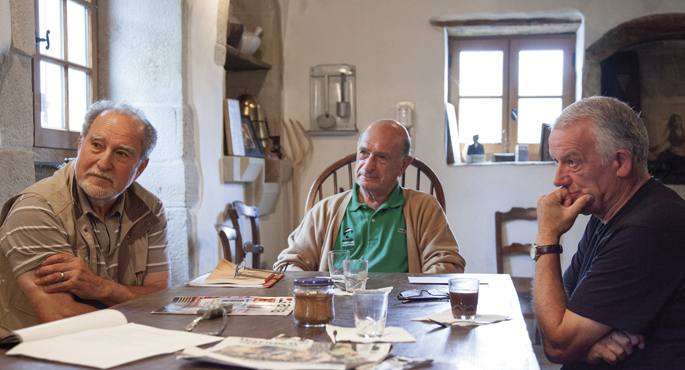
We have met with the friends of Anai-Artea in the Larraldea cultural house of the Amotze district of Senpere: With Jean Fagoaga, Battitta Larzabal and Mixel Mendiburu. We've come through Mendiburu senpertarra. The last words of this that we collect in the conversation, those that capture the spirit of the three, we have brought them forward: “A human chain of support for prisoners from Durango to Pamplona has recently been carried out. However, the human chain is not made by a party or a group. People have to meet more often, patriots, to start with. We have to classify the issues, both at the top level of politics and in the peoples, working on the issue of prisoners every day. You have to work at the top level, but that starts from the bottom and you start working together. The release of Basque prisoners and the return of exiles will not be achieved individually.”
We're talking about Anai-Artea. Where does his birth come from?
Jean Fagoaga: The creation has been natural, as the fugitives came to troops on the other side: something had to be done, they needed papers. It was the first problem. They had to give them the Récépissé to be legally planted. We were accompanying them to the San Juan de Luz police station. Later, one more step, it was the desire to ask for the status of politique réfugié. It was therefore necessary to organize themselves in order to receive these young people. To do so, we set up the Anai-Artea association, it was the idea of Telesforo, next to Piarres Larzabal.
Mixel Mendiburu: Jean Barnetxe, Larregain, Etxezaharreta... Later, attorney Christiane Fando and her sister also acted. The members of Anai-Arte were responsible for the health of the refugees, helping them to create children. All the fugitives coming from the south passed through the premises of Marion Garai Street in San Juan de Luz. One of its representatives distributed the support materials coming from the other side. The Anai-Artea became official in 1968, but functioned as a Société de fait from before, without official status, since the first fugitives arrived in 1959.
Battitta Larzabal: I met the first refugees – Madariaga, Txillardegi and others – in 1962, after coming from Algeria, but then I went to Paris. There I also met the refugees, in the Basque Country Etxea. They weren't very admitidos.Ni even the outbreak of the storm was well known. There were changes in the direction of the Euskal Etxea and it was accepted. We were dealing with refugees here and there in Paris. I went back to the Basque Country in 1971, and I started in Enbata as a humble militant. In 1974 we created HAS and EHAS, Santi Brouard was a burukide. Then I entered the Anai-Artean. The Enbata publication made known the names of the 150 refugees, to house those who needed a house and we asked for help. We launched the first major challenge to the French Government. This was the last issue of Enbata with a bulge, because the Government had banned the Enbata.
What relationship did you have with the refugees?
J. Phagoaga: When they arrived, here they continued their lives, with hardly any contact with the people of the North. They were children of descendants of the civil war, considered as military. They stayed in inns, they had no dealings with the politicians of the North, they stayed with each other, they differed a lot, voluntarily. Politicians, including Jakes Abeberri, criticized: “How can they not get into life and politics here?” they said. In society here, there were some who agreed in favour of them, even the most radically opposed. We lived, to tell the truth, a kind of despair on our side.
Doctor B. Larzabal: However, in 1971 I saw Madariaga and those in Enbata. It must be acknowledged that they have contributed to the construction of the Ikastolas, some of them have learned here and have taken root. Among the teachers of now there is one of them. More than men, to tell the truth, they dedicated themselves to brides. There have been generations and generations, different times and situations.
J. Phagoaga: Probably two key times, Franco's and his death's. The situation changed radically. At the time of Franco, ETA enjoyed such prestige in the North and in the rest of France. ETA was fighting a dictatorship, so the fugitives were helped. France seemed like a politique Réfugié Status. The dossiers should be prepared well in Hermaná-Artea. Some openly said that they belonged to ETA. Some were admitted, given the Statute and others, on the contrary, were expelled.
What can you say about Telesforo Monzón? He was later the driving force behind Xiberta's conversation.
J. Phagoaga: Monzón's class was natural. Telesforo started to admire those kids who were fighting Franco. However, he saw that his party (PNV) had disappeared, that it did nothing. “Where is the PNV?” he said. Monsoon saw a light through ETA. He was convinced that the children had freed the south from the dictatorship and the priest Larzabal. They were both convinced that they would win one way or another.
M. Mendiburu: We were young, politics was about Monzón and Larzabal. We were in the limbos somehow, because we didn't understand a lot. We were moved by the fugitives and cared about how to receive them. Our task was to fold them to society here. We lived more in this, the others were engaged in high politics. We later realized that there were talks in Gijon, but that was not our business. After a while we learned the concerns of defeat: “If we had more time! If we had met earlier, perhaps we would have gotten closer.” For us, the important thing was for the refugees and the citizens here to understand us, because, first of all, we have other languages and we are not always speaking in Basque. It was the clash of the two cultures.
Doctor B. Larzabal: Xiberta's interviews became known later, and they're in the book Acta de Xiberta. In a nutshell: ETA and the PNV applied their religion. The PNV did not change its position, the agreements it had already made, especially with the Socialist Party, which had a wide margin. About Navarre, among other things. ETA, for its part, had already said before that it would not accept some things. Let us suppose that the Spanish Government intended to grant amnesty to the Francoists, while those of ETA were expelled from the State. The Spanish Government established its own conduct. At no time has the PNV clarified how these transitional arrangements were, or between whom, and under what conditions. Monzón said that “if the two nationalisms do not meet, we have nothing to do.” There are untouchable agreements in French and Spanish politics. For Errate, in France the left and the right rule from time to time in cohabitation. Here, unfortunately, no. They also agree on foreign policy in general. If we do not do the same, if the PNV does not get into the spirit of a state, it will be difficult.
M. Mendiburu: I have a memory of Monzón. We had to know whether they were going to bring ETA as a terrorist group or not. The meeting was held in Germany. The glorious Monsoon came from there and Larzabal asked, “What’s new?” Monzón said: “ETA has not been considered a terrorist group in Europe, while IRA and others have been.” That was a tremendous victory. A year later, ETA was incorporated into terrorist groups following the sale of Siemens trains to Spain by Germany. Another anecdote I have: The Jeltzales had been tired of going to the subprefecture to search for papers. Meet those of ETA and these: “Wow, if you had won the war, we wouldn’t be here!”
The transition begins in Spain.
J. Phagoaga: When the transition begins in Spain, Giscard d’Estaing is the president in France. He absolutely wanted Spain to become a democracy. He did his best to do so. When the King of Spain was established – d’Estaing loves the King, d’Estaing also the noble – he wanted to save Spain. However, ETA continued the attacks and in France it had seen nothing good, nothing good. Everything had changed at the time. ETA also started to change: Miles, miles, special... Difficulties in Anai-Arte also increased.
Later came the harsh era of the GAL.
M. Mendiburu: At that time the houses were filled with fugitives and the Anai-Artea campaigned a great deal. The LAGs were talking hard, and we, our LAGs, also had an incredible fear. The police beat the crowd in large raids. People were at home and at the same time it was hard to resist the GAL or organize something. The Anai-Artea was also surrounded by our peers. Fear was terrible. People died like lapines.
J. Phagoaga: Felipe González was head of state. When they organized the GAL, they did a great deal. That is, those of ETA operated in the South and in the North had the Shrine or hostel. Until then the French authorities did not move too much, but when the GAL began to kill stabbed here, France was forced to protect its cytoyennes. So the attitude of the local population changed radically. Eliminators and deportations started. The attitude towards ETA changed fundamentally thanks to the GAL, it is evident to the Spaniards, if not the struggle would continue.
M. Mendiburu: At the same time, it was an IK action campaign against tourism: No tourism! Lemona. France launches a psychological campaign: "Isn't there tourism? Who is to blame for the attacks? That of the refugees.” Tourism has caused damage, but many people here lived or still live. What happened was that a number of people who until then were in favour of the refugees hurled over them. The whole atmosphere here had changed. IK had its reasons for opposing tourism, but the campaign was badly done. Or they did it differently, explaining things well. The campaign was incomprehensible. The Taludes of the auzapes of Senpere were the IK attacks that we had called to the House of the People: “You must condemn,” he told us. Terrible. The parents of the SEASKA ikastolas asked us to condemn these actions. “We are not a political party” we said, we can see nothing, but...
Doctor B. Larzabal: It must then be remembered that there were political changes both in the South and in the North. The Socialist Party was present in the governments of France and Spain. In 1981, the descendants of the generation that participated in the Second World War came to power. These were far from Francoism, far from even French resistance, it was another generation. Relations between the two countries became more fluid. The Interior Minister was Laurent Fabius, current Foreign Minister. That is what gave the orders for the deportation and expulsion of the refugees, and today it continues to govern. Imagine, the GAL was still strong and Le Monde denounced the government’s attitude: you do nothing against the GAL. Those of the GAL were moving here as tourists.
An infernal decade. The talks in Algeria were a milestone later.
Doctor B. Larzabal: France feared that the force of patriotism in the South would extend to the North. And we must also look at the future of Europe. The Member States do not disappear, on the contrary, the European States now have their borders in their agreements, with Germany at the top. There are also agreements in favour of minority peoples, but they were not made sufficiently vigorously in the beginning. However, the east of Europe disappeared, and there are minorities and there are some who have entered Europe as states. In theory, there are possibilities.
Is Europe the option of the Basques?
Yes [All three have said yes].
Doctor B. Larzabal: Borders are disappearing, but it is France that is doing the most against the least-favoured countries. As against us, against the Bretons or the Corsicans.
J. Phagoaga: It must be stressed, however, that we Basques have not achieved any unity in politics. We don't have a remote conception of looking, of organizing together as a state. On the other hand, the French and Spanish states always agree against us, they always unite. Look now at a small structure for the Single Community. Basically, France says no, it is afraid and joins Spain. I see things very difficult. If Euskal Herria is not formed in this era of European reconversion, it will never be.
The Lizarra-Garazi Agreement and the Loiola talks came later. Option to choose, on the left Abertzale with the PNV some times in other with the PSOE, but always with defeats. Today, ETA has abandoned its business. Did you expect it? As it has been?
M. Mendiburu: When we learned the harsh words of Xabier López Peña (Thierry), a member of ETA, we think that “we live in dreams”. People think and react without a doubt. To change things, it takes time, time to change the direction of the boat. There came what had to come. Naski, if he arrived twenty years ago, would have more credibility, so we have to gain credibility.
Doctor B. Larzabal: The pp knows that ETA is not going to follow. Their escorts were removed to begin with. In part they believe, but Madrid’s interest in putting an end to this issue is different. Because political change must be brought about, agreement must be reached for another political framework. However, it wants a differentiated Navarra and to remain the same as it is now. If you can, moreover, we've seen it in education policy, for example.
J. Phagoaga: The Spaniards want to show that “ETA’s terrorist adventure has been a great failure.” They have given autonomy in their goodness in local countries, and nothing because of ETA's pressure. They don't want to admit that. They don't want to admit that it was Tejerazo. They do not want or remember that it was a coup d'état, they do not help Euskal Herria have autonomy. The Spaniards mean that ETA has been in vain. 700 prisoners are in prisons and want ETA to be recognised as being guilty.
What would Euskal Herria be without the evolution that has taken place in the last half century?
Doctor B. Larzabal: Things to start in the north have changed a lot. I didn't know the same word abertzale 50 years ago, for example.
And what about the future?
Doctor B. Larzabal: Franco left "everything tied and well tied." Everything in the French Constitution is also limited. The same laws as always. Without the attitude of France and Spain, the situation of Euskal Herria, the North and the South cannot be changed. What can we do with most of us? Concerning the Geneva Convention, for example: Although ETA members are brought in as terrorists, torture is not legitimate. France and Spain had to take this into account and apply it first, but they have not done so.
J. Phagoaga: We say aloud that those of ETA have fought for their people, who have risked their lives. Those are now the ones that are needed to save them and help them. But it will be difficult.
M. Mendiburu: Of course, we need those prisoners to raise their heads. Individual or group, whatever you want or can, but with all the honors.
Doctor B. Larzabal: When I see the prisoners, I see the Jews and the laws. ETA cases are considered evil, as members of the malefactors association. I spent two years in Algeria, I met the prisoners there, I had friends and peers in the school building. At that time, until February 20, 1962, they were brought in as evil and terrorist, but after a month they became heroes.
Standing up for EPPK (Basque Political Prisoners Collective) prisoners is a greater risk in the 21st century than it was in the worst times of the Franco regime, as is political activism in their favour, being concerned about their rights, or helping their relatives financially... [+]
Espainiako Auzitegi Nazionalak igorritako euroaginduari ezetz esan dio Paueko Auzitegiak, eta horrenbestez ez dute Emilie Martin Bagoaz taldeko bozeramailea Espainiaratuko. Gainera, militante abertzaleari ezarritako kontrol judiziala kentzea ere deliberatu dute epaileek. Hala,... [+]
Gutun mota asko iristen zaizkit. Horien artetik aprezio berezia diet politikoki nigandik urrun xamar egon daitezkeen lagunek idatzitakoak direnei, euskaldunok espetxearen inguru-marian antolatu antzera duzun zirkulutik kanpokoa denean, non hasi bai baina non bukatzen den argi ez... [+]
Guardia Zibilak 16 lagun atxilotu zituen astelehen goizean Euskal Herrian eta Madrilen, abokatuak gehienak, ETAri babesa ematea eta Ogasun Publikoaren kontrako delitua leporatuta. Epailearen aurretik pasa ostean, hiru kartzelara bidali ditu. Azken hiru egunetako albisteen... [+]
Sarek oharra atera du astelehenko polizia operazioaren harira. Ondoren dago osorik irakurgai.
Herrira legez kanpo utzi ostean, euskal preso eta iheslarien eskubideen alde lan egingo duen plataforma berria aurkeztuko dute igandean Donostian.
On October 1, 2013, I needed the links I don't have with the sources of information to interpret what the raid meant against the Herrira association. You have to have data and hypotheses, Mr Lehendakari Iñigo Urkullu, where a walking journalist only has questions: Is it a step... [+]
The image of the return to the past has spread in many places as a result of the operation against Herrira carried out by the Spanish National Court. The truth is that the photo reflected that: the pride of the civil guards, the detainees, the aggressions of the Ertzaintza, the... [+]
Amaiurreko senatari Amalur Mendizabalek salaketa jarri du Donostiako epaitegian, Herrira-ren aurkako operazioan bera buruan jo zuen ertzaina identifikatzeko helburuarekin. Hernanin kolpatu zuten buruan.









